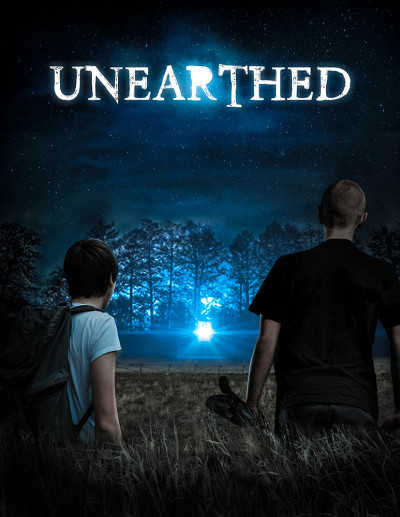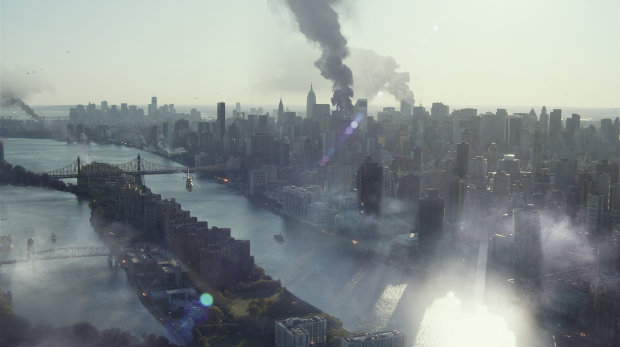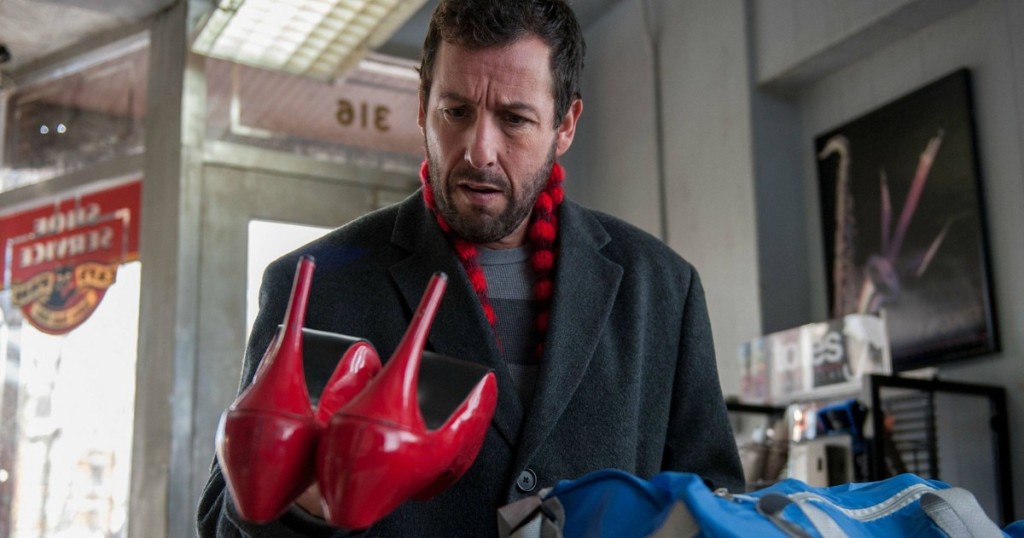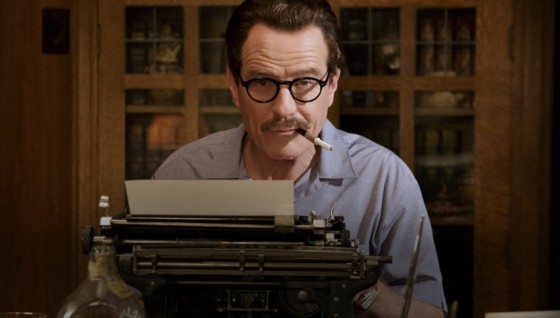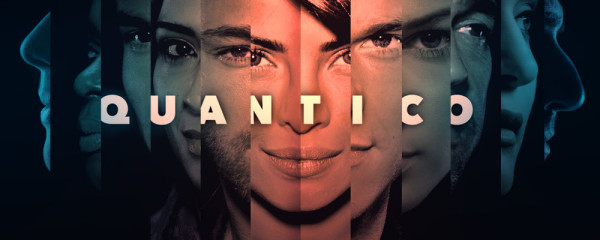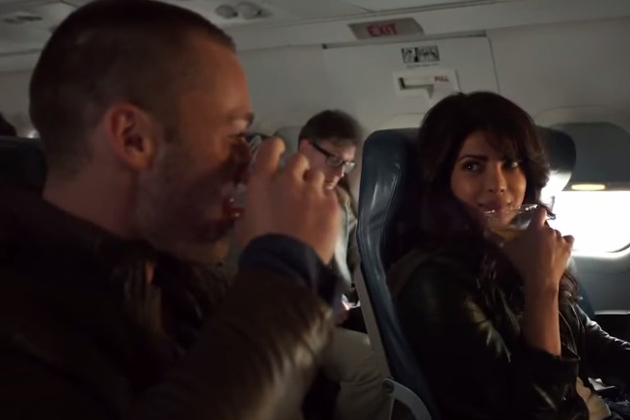What am I doing?? I just gave you two extra weeks to get your Scriptshadow 250 entries in and now I throw an Amateur Offerings post up? I might as well title this post, “Please Procrastinate!” I guess I’ll leave it up to you guys to use this post responsibly. Talk soon!
Title: Unearthed
Genre: Sci-Fi
Logline: Two young brothers search for buried treasure with hopes of helping their struggling family, but when they uncover an otherworldly artifact with mysterious properties, they find it may have far greater value than they imagined.
Why You Should Read: This is my sixth screenplay and I’m still realizing, “Man this writing stuff is still hard!” Several months ago, I received two rounds of notes from Carson and after each round, I sucked it up and made the necessary cuts and addressed the dreaded “more character development” notes. Now I hope to get another round from the SS faithful. Carson described this as Stand By Me meets E.T. I thought that was a great comparison, and basically what I was aiming for. No big explosions. No black ops military assaults. No zombies driving fast cars. Just kids on an adventure. Period. Hope you enjoy it. And it chosen, I will definitely be around and interacting in the feedback if I’m lucky enough to have anyone read it.
Title: Reap What You Sow
Genre: Thriller
Logline: When her homecoming ends in tragedy, a desperate single mother spins
a web of lies to protect the family nursery from a ruthless property developer.
Why You Should Read: Dilemma. Textbook definition: A situation requiring a choice between equally undesirable alternatives. According to the book “Screenwriting is Storytelling: Creating an A-List Screenplay That Sells” by Kate Wright, “The moral dilemma of a main character is one of the least understood critical elements of story.” A genuine dilemma forces your main character to make choices that will have escalating consequences your script must explore. One dilemma leads to a downward spiral of decisions that exploit your protag’s weakness.
My goal was to explore the main character’s dilemma in the most entertaining and efficient way I could. All too often, I’ve found myself obscuring story elements, because I thought it would create an air of mystery. Since then, I’ve learned that all it does is alienate and confuse readers that are trying to help me. This is my attempt to combat that ambiguity. I also think a Thursday Screenwriting article about the “Art of the Dilemma in Screenwriting” would be an epic topic for your blog. Thanks to the SS250 deadline extension, I’m beyond thrilled to go for this chance to workshop my script with the generous Amateur Offerings readers before the contest starts.
Title: Patsies
Genre: Comedy
Logline: After actually pulling off a daring art heist, a gang of knucklehead thieves discover that they’re patsies in a forgery scam run by their porn tycoon boss. While hunted by the tycoon’s hit man, they evade a LAPD dragnet, death, and their own dysfunction to clear their names and turn the tables on the tycoon.
Why You Should Read: After taking time off to try our luck again in animation where we had a bit of success prior to writing the AF submission “Mad Dogs,” (BTW —Thank you everyone who sent us notes on that script. They really helped.), we’re back with character based comedy. It’ll be interesting to see if our sense of humor resonates with the Scriptshadow folks. The inspiration of this film comes from watching A-List studio heist flicks and how in most of them, like the remake of “The Italian Job,” the crooks spend a shit ton of money just to set up the robbery. If they have that kind of cash in the first place why don’t they just freakin’ buy and retire to a tropical island? PATSIES is a character driven lo-fi comedy version of a studio heist film. Also, it explores the types of dysfunctional characters who would turn to stealing to make a living, i.e. the down & out, the desperate-for-a-break, and the not-too-bright.
Title: Rogue
Genre: Spy/Action/High School/Fantasy
Logline: On his first day at his new high school, a student wakes up in the nurse’s office with amnesia, a bomb implanted in his chest, and a masked man who gives him a mission: assassinate every member of a clandestine terrorist cell operating within the high school by 3:30 PM or the bomb in his chest will be detonated.
Elevator Pitch: If John Hughes had said, “I’m going to loosely adapt The Borne Identity with my new best friend Terry Gilliam and I want to set the entire thing in a high school,” you’d have Rogue.
Why You Should Read: I laughed to myself during Weird Week when you said that every writer should try their hand at a go-for-broke-disregard-the-rules-sure-you’ve-only-got-a-slim-chance-at-pulling-it-off-but-what-the-fuck-let’s-go-for-it-anyway-script. That’s the sort of screenplay this is. This is my attempt at a Marvel Movie and it’s so idiosyncratic and funky that I can’t not be proud of it.
Title: Triggered
Genre: Action/Comedy
Logline: A hapless college student who’s in trouble with local drug dealers and a freewheeling ex-spy who’s on the run from his former employers cross paths one night and discover they are the answers to each other’s problems.
Why You Should Read: Triggered is a hard-R, gloriously un-PC action-comedy about how a computer science nerd with girlfriend problems and a profane, amoral ex-secret agent find common ground through a night of wild encounters with gang members, cops, drunken frat boys, and enemy agents. Triggered is part college comedy, part spy thriller, done in the style of classic buddy films.
The Scriptshadow Newsletter is OUT. It should’ve reached your Inboxes this morning. Make sure to check your SPAM and PROMOTIONS folders if you didn’t receive it. My guess it that it’s in there. Hope you enjoy!!!
Genre: Action-Thriller
Premise (from writer): When every major city across the United States is attacked by an overwhelming paramilitary force, a Special Ops team has less than 24 hours to breach the war zone of New York City in a last chance attempt to retrieve a device that could turn the tide of war, before the US government takes drastic action and initiates the ‘Endwar’ protocol.
Why You Should Read (from writer): Hey everyone! I was recently inspired by a similar type of script that was recently featured on Amateur Friday with it’s use of artwork, so I’ve decided to do a similar thing myself, featuring the images on standalone pages, rather than behind/beside the text (so don’t freak out at the page count, it’s not as long as it might look). I have long had a fascination with war stories, but where this is different is that it takes place on American soil (something only very few films have explored in the past). The script was kind of an experiment in going big, unlike my previous scripts which were much smaller in scope. I want to take this script to the next level, with your notes Carson, and with the notes of the SS community. Thank you to everyone who can help.
Writer: Mark Ducass
Details: 147 pages (although artwork-heavy – so not a true 147)
It’s a good time to be writing a straight action spec. The studios haven’t bought one in awhile, and while a lot of people might think that’s a reason NOT to write action, I see it differently. If they haven’t bought an action script in awhile, it means they’re going to buy one soon. It’s not like action is going out of style.
But action is a funny beast. The writers who are good at it tend not to be as good at the other stuff. The characters, the emotional beats. Even the plotting suffers at the opportunity to inject another gun fight, another explosion, another car chase.
Finding that rare writer who can write both action AND emotion? You locate that guy and you’ve got yourself a professional screenwriter. Does Mark Ducass fit the profile? Jump in my jet, hop over my explosion, engage me in a brutal fist fight, and let’s find out!
Endwar starts out strong. The opening scene shows Air Force One being attacked from both the inside (one of the president’s security agents opens fire) and the outside (one of the accompanying jets lays down fire on the enormous plane). We’ve seen this kind of scene before, but there’s a clean and exciting visual style to Ducass’s writing that elevates this scene above the competition.
Meanwhile, Manhattan is falling apart. Someone’s hacked into the stoplight grid and made all the lights green. As a result, everyone’s crashing into each other.
From there we jump to an aircraft carrier stationed off the Atlantic coast. It’s here where we meet our Delta team. The “haunted” Commander Eisner. Newbie Edward Calvin. Party boy Phillip Vance. Hot as hell Kira Simmons. And immovable object “Bear” Walters. The group has just gotten back from a mission when a nearby ship – an American ship – starts attacking them.
The team realizes that something is very wrong here, and after dealing with the ship, they’re sent into Manhattan to see what’s going on. Unfortunately, things there have gotten worse. Random people are just picking up guns and shooting everyone they see. Like Chicago now but not as bad. Apparently, some sort of sound pattern is being broadcast over the airwaves and turning everyone into deluded soldiers.
Once in New York, Eisner and crew meet up with CIA operative Brandon Weaver and his nerdy tech assistant, Tim Emerson. After the obligatory comparing dick sizes scene (although I have to give Ducass credit for not having one of the female characters utter the line: “You guys done comparing dick sizes yet!?”) Weaver leads the group to a building where this signal appears to be coming from.
They eventually find that the bad guys are a part of the “New World Order,” a group of people who have secretly been in power for centuries but who have finally decided that they don’t like the “secret” part of their ruling approach. So they’re taking shit over public style.
Weaver and the Delts (hey, that sounds like a band name!) eventually discover some giant power sphere in the city that is the key to the NWO taking over the world. They realize if they can destroy that thing, they might have a shot at stopping the takeover. Of course, not everyone wants to help when they learn that the U.S. government has enacted the “Endwar” protocol and plans to blow the island up in three hours. Time, as they say in the military business, IS TICKIN’!
Let me start off by saying the action writing here is kick-ass. But I think it could be better. The best action scene in the movie is the opening. That’s a good thing and a bad thing. It’s good cause it pulls us in right away. It’s bad because no other action scene lives up to it, leaving us disappointed when we read everything else.
Why aren’t the other action scenes as good? BECAUSE THE ACTION SITUATIONS AREN’T AS GOOD. What’s great about that opening scene is that the objective – or what’s going on – is interesting. They’re trying to take out the president both inside AND outside the plane. There were a couple of dimensions going on there. And the stakes were sky high (how do stakes get higher than protecting the president? In the sky!?).
As far as the rest of the action scenes (with a few exceptions) they were quite basic. Someone comes to fight them. They fight back. They didn’t have the same depth or variety as that opening scene. And as a result, they felt kind of generic. And generic action is death in an action film.
I mean, this is the highlight of your script, right? Action is what you’re showing off. So if you’re not consistently giving us something different in that arena, what’s the point of even writing an action movie?
Moving on – just because this is an action movie doesn’t mean you can’t have slow intense moments between your characters every once in awhile. Die Hard is considered one of the greatest action films of all time. Yet it has that intense scene between John McClane and his wife early on where they fight about the state of their marriage. It has a scene where the cop who helps John confides in him that he killed a kid while on duty once.
If you don’t give us those emotional moments that connect your characters, we’re not going to see your characters as real people. We’re going to see them as cardboard cut-outs. I know it’s scary to slow an action movie down. But you need to do it sometimes.
Moving on to the plot, I’ll just say this. It’s too generic. This reminded me of the kind of plot I’d see in a video game. Like a bad cut-scene type video game from the early 2000s. And the thing is, I liked how it started. I liked the signal. I liked innocent people attacking our Delta team. But the plot fell apart the moment “NEW WORLD ORDER” was uttered.
The New World Order is such a generic been-there-done-that early 2000s solution to this problem that after it was announced, I couldn’t take anything seriously anymore. If I were you, I’d drop that nonsense and come up with your own mythology for this takeover.
Also, introduce more plot into the story. It seemed like we went WAY TOO LONG between major plot points. It wasn’t until page 72 when we learned who the bad guys were. I just felt like there weren’t enough interesting things happening frequently enough. I’m not saying you should do this but maybe one of their team is secretly a bad guy? Or maybe the signal starts creeping into their ranks. So these guys start turning on each other. Anything to add more VARIETY to the plot. Because that’s Endwar’s biggest problem. It’s too generic. You need to mix it up.
And you can do it. You’re a good writer, Mark. This script may not have been for me, but if a producer asked me what the last thing I read was, I’d say, “You know, the script was a little generic. But the writer had a lot of talent. Especially for writing action.” So go in there, improve on the stuff OTHER than the action, and you’re going to see your scripts get a lot better.
Script link: Endwar
[ ] what the hell did I just read?
[x] wasn’t for me (but the writer is definitely someone to watch out for)
[ ] worth the read
[ ] impressive
[ ] genius
What I learned: Beware SKIM-DESIRE. Skim-desire is the desire for the reader to start skimming. And it occurs when a script is boring, repetitive, or not making sense. In the case of Endwar, there was too much repetition in the action. Scene after scene was straight action with no variation in pacing or plot development. If you do too much of this, the script takes on a repetitive nature, and the desire to skim is strong. Which is what happened to me. I got hit with action scene number 7 in a row and I just thought, “There isn’t a whole lot happening here other than action, so I’m probably not going to miss much if I start skimming.” To prevent this from happening in your next draft, vary the plotting and tempo of your story.
Note: The Scriptshadow Newsletter is coming TONIGHT. So check your spam and promotions folders to make sure you get it. I’ll be reviewing THE HOTTEST SPEC in town, which just sold, and also offer a few goodies about The Scriptshadow 250 Screenwriting Contest. If you’re not signed up already, you can do so here.
So this past week I’ve been thinking a lot about Sony. Not too long ago, Sony was the number one studio in the world. With franchises like Spider-Man, Men in Black, and Bond, it looked like they could do no wrong. Now, they’re trailing behind mini-studios like Lionsgate. Their biggest film this year has been Paul Blart: Mall Cop 2, which made 70 million dollars. In comparison, Universal’s number 1 movie, Jurassic World, made 600 million dollars. And don’t get me started on worldwide grosses.
The obvious question, then, is, “What went wrong?” Well, they made a bunch of bad movies that nobody cared about. That’s what went wrong. So how do you fix it? Sure, us backseat studio heads love telling studios how they’re raping cinema by greenlighting too many sequels, superheroes, and remakes. But what would we do differently? What would we do if we had TOTAL POWER to choose Sony’s slate?
As I asked that question, I began to realize just how important screenwriting is. Because while a lot of people will tell you that the key is great IP, the hidden ingredient is screenwriters who know how to craft a good story. I know, I know. I have to say that since I run a screenwriting site. But think about it. While IP is definitely important, Sony’s proven that it’s hardly full proof.
It wasn’t long ago that Spider-Man was THE biggest property in the world. Even bigger than Batman! Yet I’d make the argument that the reason the last Spider-Man failed was because it was a total screenplay hack job. You watched the trailer and had no idea what the movie was about. And, in fact, that’s the same reason the original Spider-Man franchise (with Toby Maguire) fell apart. Because the third movie tried to cram too much shit into the story and the story couldn’t handle it.
So don’t tell me execution isn’t a factor in making a good movie. You can say what you will about Jurassic World being generic, but that movie knew exactly what it wanted to be. And it gave us a clear and concise story that audiences could easily follow.
It was somewhere around here that I had my come-to-Jesus how-to-run-a-studio clarity moment. To run a successful studio, your movies need three things.
1) Great IP.
2) Big concepts.
3) Larger than life characters.
If you look at every single major studio movie over the last ten years, they will have at least one of these three elements and usually more. From Marvel to Star Wars to The Hunger Games to Harry Potter to Shrek to Pirates of the Caribbean. IP. Huge concept. Larger than life characters. Movies that contain these three elements are what keep studios afloat.
After that, there’s a second tier of lesser-known elements that need to be in play. These won’t matter unless you take care of the first three elements. But once you have those in place, you must make sure these are there as well. They are…
1) Script execution (like we just talked about).
2) Directing execution.
3) You need to give a shit.
Now that last one might seem trivial, but I believe it’s the secret ingredient that either saves or sinks a film. Everybody involved in a movie, from the writers, to the actors, to the directors, to the producers, to the studio itself – THEY NEED TO CARE. If they don’t care – if they’re not extremely passionate about bringing that film to life – than that film will never come to life. Oh sure, some disembodied version of it will make it to the big screen. But it will be lifeless. And we’ll sense that. And we won’t go to see that movie as a result. It’s the reason Die Hard, once the biggest franchise in the world, is so awful today. Everybody knows Bruce Willis doesn’t care. And since he doesn’t care, no one else does.
And that’s why nobody showed up to Pixels (Sony’s major bet this summer). Adam Sandler embodies the “I’m not taking any of this seriously” mentality. There’s not an ounce of passion in that man’s body. He doesn’t realize that movies have gotten too big to succeed on this laissez-faire approach. Tickets cost too much. And audiences smelled that as the movie neared. And that’s why they didn’t show. Contrast that with James Bond. I’ve gone on record as not being a huge fan of the tuxedoed martini drinker. But I take one look at that Bond trailer and I can tell everyone involved wanted to make a good movie.
So what does all of this have to do with you? How does this affect you? Well, here’s the beauty of today’s realization. Of the six things that I mentioned a studio movie must have to be successful, YOU HAVE CONTROL OVER THREE OF THEM. You can write something with a huge concept, add a larger-than-life character, and execute the hell out of it.
And here’s where things get really fun. Any company in flux? Any business that’s failing? They need to take chances. What they’re doing isn’t working so they need to try something different and that’s why I believe this is the perfect time to try and write a spec for Sony. Mind you, they’re not going to pay attention unless you get the concept, the larger than life character, and the execution down. But if you pull those off, there’s a damn good chance they’ll buy your screenplay. Because they NEED YOU. They can’t make it without you. As is the case with all of these studios hanging onto the bottom rung (you know who you are).
And that’s exciting. Wouldn’t you say?
Today’s script asks the question we’ve all been wondering since we took up this craft – “Is it possible to write a good movie about a screenwriter?”
Genre: Biopic
Premise: The real life story of Dalton Trumbo, one of the greatest screenwriters of all time, who was blacklisted from the entertainment industry during the 40s and 50s for openly embracing communism.
About: Starring Breaking Bad star Bryan Cranston, Dalton Trumbo is one of the big Oscar hopefuls this winter season. Writer John McNamara is a longtime TV scripter, who’s written for series as varied as Lois & Clark and The Fugitive. I was actually excited to read Trumbo when I first heard about it. That was until I read Aquarius a few months ago, the awful David Duchovny show which McNamara wrote. How did we go from that piece of garbage to a potential Oscar contending screenplay? I’m just as interested in the answer as you are!
Writer: John McNamara
Details: 118 pages
So I’m thinking every writer should attempt to write a biopic at least once, and here’s why. When you write a biopic, it’s rarely about plot. The script is powered by character, specifically the character you choose to make your subject.
Because you don’t have the cozy confines of plot to power your story (the dinosaurs have gotten loose!), you have to find ways to entertain your audience through character, and what better way to learn about writing great characters than by making them the sole engine of your story’s entertainment?
We realize pretty early why Dalton Trumbo is a great character. The man speaks his mind! And he speaks it from the unpopular side of the argument. You may not create the most likable character this way, but dammit if you won’t create a memorable character.
It may sound weird to compare an Oscar contending screenplay to the pit that is reality television, but the entire reality TV industry is based on this approach: Find people who speak their minds. People who speak their minds are universally interesting. Why do you think Donald Trump is so popular right now?
“Dalton Trumbo” introduces us to its title character not long after those dang Nazis have been taken care of. The man is the biggest and baddest screenwriter on the block. Heck, he’s so rich he’s building a lake next to his mansion.
While Dalton celebrates his riches with his wife, Cleo, as well as his growing family, a new fear is sweeping the land – COMMUNISM. The Russians have taken the place of the Nazis as America’s enemy, and Dalton Trumbo doesn’t think that’s right.
I mean, Communism basically stands for everyone being taken care of. That’s in stark contrast to a place like America, where if you live on the street, the most help you’ll get is someone screaming, “Get a job” as they splash a puddle of dirty water over you from their passing car. Not exactly the kindest ideology.
So when the U.S. creates something called the House of UnAmerican Activities Committee (worst committee name ever??) to hunt down communists in Hollywood, Dalton becomes the face of the resistance.
What starts out as a giant joke (Trumbo yukking it up when called in to testify for Congress), quickly gets serious, as the most vocal offenders start losing jobs in Hollywood. Trumbo stays defiant though, pointing out how ridiculous this all is. Until he’s sent to prison for his beliefs.
Trumbo gets out a year later to a different world. If you even THINK the word “communism,” the entertainment industry will turn you into the real-life version of an end credit. It was the only time in Hollywood history where someone could say, “You’ll never work in this town again,” and it actually be true.
But the always defiant Trumbo went underground and started writing movies for other writers who COULD get movies made, then taking half the paycheck. In fact, Trumbo wrote one of the biggest movies of all time, Roman Holiday, this way, only getting proper screenwriting credit 60 years later. On a side note, that must’ve been one hell of a WGA arbitration.
Eventually, Trumbo scraped together his band of merry blacklisted rejects and started writing for the “Roger Corman” outfit of the time, King Brothers Pictures. Some of the greatest screenwriters ever were writing moves about insect aliens and Bigfoot.
This led to Trumbo hitting a creative low-point, which drove him to write a little movie about a boy and his bull called, “The Brave One.” The film went on to win an Oscar for Trumbo under the name, “Robert Rich.” This led to Kirk Douglas calling Trumbo and asking him to write a little movie he was working on called “Spartacus.”
Despite Congress and many in Hollywood trying to strong-arm Douglas into getting Trumbo’s name off the film, newly elected president, John F. Kennedy, famously went to see the movie at its premiere, effectively ending the Blacklisting witch-hunt.
Well call me biased since this is about a screenwriter but… HOLY SHIT WAS THIS GOOD! I mean, McNamara succeeded in the first rule about writing about writing, which is to not show any writing! The Brave One, for example, is written in less than a page here. And I’m not sure we see any writing on Spartacus at all.
Dalton Trumbo wisely keeps the focus on ACTION. And I don’t mean Michael Bay action. I mean keeping the main character ACTIVE. Trumbo is always going after something here, always stirring shit up. And that’s what keeps this screenplay, which is essentially a bunch of talking heads, trucking along.
Like I said at the beginning of the review, you start with character in your biopic. You gotta give us a lead who’s exciting to us. And Trumbo achieves this because he takes on the establishment. When you take on anything bigger than you, you’re going to receive a lot of shit back, and that’s where drama lives, in the space between pushing and getting pushed back.
And McNamara doesn’t stop at making Trumbo a shit-stirrer. He makes him a hypocrite too. Note to writers: Characters who are hypocrites always illicit a reaction. So they’re a good character trait to add.
Trumbo is this extreme liberal who’s all about standing up for the little guy – giving the poor man on the street a hearty meal and a place to sleep. And yet he hoards his millions and enjoys the perks of living in the biggest house on the block (and building fucking lakes next to that house!).
I thought it was quite interesting that Trumbo’s hardships never got that bad. Even when he’s at his “lowest point” he only has to move into a “semi-mansion.”
You may think that all you need to do with a character like this is sit back and let him entertain. But you still have to build a plot into your story. And with biopics, that plot must be nuanced. Remember, your main character has to remain the star of the film. If the plot is too big and starts bullying your hero around, the screenplay loses its punch.
So McNamara adds some big – just not “too big” – goals for Trumbo to go after. At first, it’s to stand up for the first amendment. Trumbo knows his opinion about communism isn’t popular, but he’s fighting for the very American right to have that opinion. And the conflict he encounters through this battle drives the first half of the screenplay, culminating in the prison sentence.
The second half of the screenplay, when he leaves the prison, then becomes an underdog story. Now that Trumbo has fallen and nobody wants to touch him (even his best friend has publicly shamed him), Trumbo’s goal is to thrive inside a system that refuses to let him write.
The irony of Trumbo writing monster flicks eventually leads to one of his screenplays winning an Oscar, which reignites the debate of whether blacklisting is necessary. Having one of the biggest stars in town then ask him to write his next movie is the final nail in the blacklist coffin.
“Dalton Trumbo” is also peppered with these brilliant little additions, such as making American icon John Wayne the villain of the film! Wayne, who’s clearly playing the role of a 2015 Clint Eastwood, is the biggest supporter of the flag-waving blacklist movement, and the battle between this little screenwriter and this giant movie star is one of the script’s highlights.
There’s not much to fault “Dalton Trumbo” for. I suppose its biggest weakness is its subject matter (trying to get people to watch a movie about a screenwriter in the 1950s – I wouldn’t want to be on that marketing team – Movie Trailer Voice: “This holiday season, one man uses his pen to change a nation.”). But if Bryan Cranston can pull off even half of how Trumbo’s written on the page, this should definitely be Oscar-worthy.
[ ] what the hell did I just read?
[ ] wasn’t for me
[ ] worth the read
[x] impressive
[ ] genius
What I learned: In every screenplay you write, either your main character needs to be making something happen, or something needs to be happening to him. In many cases, both of these things will be happening at the same time. If you open to any page in “Dalton Trumbo,” you’ll see this. So in the first act, the government comes after Dalton (something is happening to him). So Dalton then takes on the government (he’s making something happen). The government later throws him in prison (something is happening to him). Afterwards, Dalton keeps writing despite Hollywood trying to stop him (he’s making something happen). If you ever reach a point in your script where your main character isn’t making something happen and you’re not using exterior forces to make something happen to him, your script will be at a standstill. It will feel like nothing is happening. So make sure you’re always doing one of these two things!
Genre: TV Pilot – Drama/Thriller
Premise: A new crop of potential FBI agents are recruited to the Quantico training grounds, where they’ll be put to the test in the hopes of becoming members of the prestigious force.
About: Creator Joshua Safran is an NYU Tisch grad who was an executive producer and writer on the hit show, Gossip Girl. Pitched to buyers as “Grey’s Anatomy meets Homeland,” it wasn’t long before the Shonda Rhimes network – err, I mean, ABC – bit and bought the series. I’ve heard mixed things about the pilot but, without a doubt, Quantico has become one of the big TV show bets for the fall season.
Writer: Joshua Safran
Details: 57 pages
For those who don’t know anything about screenwriting, or for those who are just getting into it, there’s this pervasive thought out there that writing comes down to opinion. Like, some people may like something, other people may not like something, but it’s all in the eyes of the beholder.
They don’t realize that there’s actually a skill set involved in writing – that whether you’re interested in a particular subject matter or not, there are indicators that make it clear some writing is better than other writing. Comparing today’s pilot, Quantico, to yesterday’s screenplay, The Pier, reminded me of that.
The skill set of today’s writer, Joshua Safran, is just so much higher than yesterday’s skill set, it’s ridiculous. And I’ll get into more detail about that in a moment. But first, let’s discuss what Quantico’s about.
Quantico introduces us to 25 year-old Alex Weaver. Alex is sexy but guarded, the kind of girl who will sleep with a man on the down low to get her rocks off, then never talk to him again, because God forbid she actually connect with someone.
On the way to Quantico, the FBI training grounds, Alex does just that, sleeping with a man she meets on the plane named Ryan Booth. After ditching the sucker, she later finds out that she was the sucker. Turns out Ryan is also an aspiring FBI agent. Joke’s on you Alex.
We also meet a wide array of fellow potential students at Quantico. There’s gay Brooklyn hipster, Simon Asher, Midwest Muslim feminist, Nimah Anwar, Utah Mormon, Eric Packer, modern Sourthern belle, Shelby Wyatt, cocksure golden boy, Caleb Haas, as well as a few others.
The group is led by 56 year-old Liam O’Connor, who, like a lot of people here, isn’t entirely who he seems. In fact, we meet the guy trying to kill himself. Now he’s in charge of these rascals.
Quantico gets interesting when, during the training, we start flashing forward nine months, where we learn that a giant bomb has taken down Grand Central Station in New York. Alex happened to be on location when it happened, and is getting grilled by local task forces, who have told her the unthinkable: they believe one of her classmates at Quantico did this.
So we jump back and forth between the training and Alex getting interrogated as to what she knows. As the pilot goes on, we realize that they believe Alex is the terrorist. Which means that Alex will have to utilize everything she learned at the Academy to get the hell out of this mess, and figure out who the real terrorist is.
So at the opening of this review, I said there was a clear difference in skill sets between today’s script and yesterday’s, The Pier. Let me explain what I mean.
For starters, “The Pier” was extremely predictable. Now every story is unique. Some stories are meant to be told in offbeat ways and others straight-forward ways. You need to factor that into any analysis. But it’s always your job, as the writer, to anticipate what the audience is expecting, and play against that to some extent.
The problem with The Pier was that everything I expected to happen was exactly what happened. I mean, I knew on page 10 that on page 60 I’d be in some dark room on that pier with some creature spooking our characters out somehow.
Quantico wasn’t like that. I expected this to be very “Grey’s Anatomy,” where we simply meet a bunch of trainees, they get into a lot of sexy conflict for 60 minutes, a cliché cliffhanger arrives on the last page (one of the characters goes back to his room, closes the door, and calls someone on a secret phone and simply says, “Yeah, I’m in.”) then “The End.”
I was not expecting the flash-forward to the terrorist attack. Not only was that a surprise, but it added a nice “parallel storyline” structure to the pilot that gave it some depth.
Another area where you can really determine skill level in screenwriting is in how the writer disseminates exposition and backstory. Yesterday’s script did an okay job of this. They needed to explain the history of the pier and they did so with a rather standard but “got the job done” scene at the local museum where a guide uses a museum artifact taken from the pier as a jumping-off point to explain the pier’s history to a group of schoolchildren. Not terrible, but we’ve seen that scene a billion times before.
In Quantico, you don’t even realize you’re being handed backstory. Which is kind of shocking since there’s a ton of backstory here. How do they do this? They wrap the backstory in a series of scenes where conflict and drama take precedence. This way we’re more engaged in the drama than we are focused on the backstory.
The FBI trainees are told that their first test is to look through a fellow trainees’ profile. One major part of their profile has been deliberately omitted. It’s their job to find out what that missing piece of info is by any means necessary, then interrogate the trainee and get them to admit to it.
In all of these cases, what’s missing is something the trainees don’t want divulged. So these interrogations play out as these intense showdowns, a dance of pushing and pulling until one of the trainees finally breaks.
Of course, we’re so taken by the drama, by the characters trying to outsmart one another, that we don’t realize these scenes are 100% backstory injectors!!! They’re used to allow our characters to ask key questions about the trainees backstories so that the reader can get to know the characters better. In short, by wrapping backstory inside of drama, you display a much higher skill set than the average screenwriter.
Finally, good writers give us endings we didn’t see coming. This is one of the hardest things to do in screenwriting because everything in your story tends to point to one clear finish line. To then spin that to give us something we weren’t expecting requires some mad skill.
Where did The Pier end up yesterday? I’ll give you a hint. Our group of characters escaped the pier. Quantico ended up in the LAST place I expected it to. Again, I thought this was going to be some hot young actor feeder pilot that would keep our group of studs and super models in the friendly confines of Quantico while they trained to make agent for the next 2 years.
But Quantico ends (spoiler) with Alex escaping in the 9-months-forward timeline and becoming a fucking fugitive. What the hell??? Now maybe that becomes our “forward” timeline and, in future episodes, we still follow the “past” timeline where we watch our trainees try to make agent back at Quantico, but either way, this is not what I was expecting.
For all these reasons, Quantico is a great script to study if you’re interested in writing for TV. I’m not going to say it’s perfect. In fact, I’ve heard a lot of people complaining about the trailer being too focused on how sexy the cast is (I’m too afraid to watch the trailer for this reason – I hate how easy it is to screw up a pilot with bad direction), but as far as the script goes, it’s really good. I’m sure there are a few people in the comments section who can help you find it if you can’t seem to locate it yourself.
[ ] what the hell did I just read?
[ ] wasn’t for me
[xx] worth the read
[ ] impressive
[ ] genius
What I learned: Set up your characters AND tell a story with your pilot. A lot of pilots I read focus exclusively on setting up the characters. Especially in these “Grey’s Anatomy” type shows, where we’re being asked to meet an entire group of people working at a new location. On the flip side, I’ll also read a lot of “Lost” like pilots that are only interested in plot. They feel more like movies than TV shows as a result. Ideally, you want your TV pilot to do both. That’s why I liked Quantico so much. One half of its storyline is dedicated to introducing us to this large cast of characters. The other half gives us the plot-friendly terrorist attack to worry about. And not only that, it weaves these two halves together. The future plot requires our main character to figure out which one of the people she trained with is the terrorist. That’s good writing!


